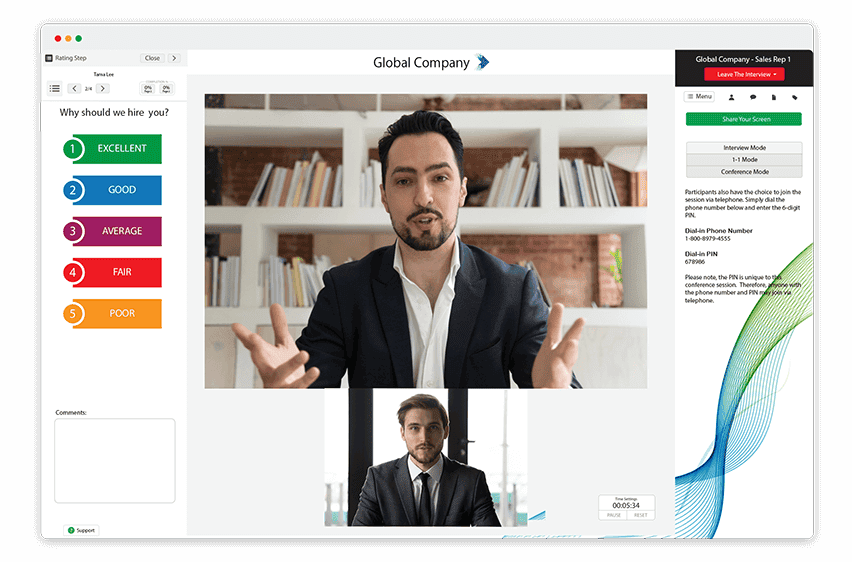
Guide to Effective Interview Scheduling
Learn what interview scheduling is and how to communicate effectively. Discover best practices to streamline the process and improve efficiency.

Law is a wide-ranging sector that employs all kinds of professionals, including lawyers, paralegals, solicitors, barristers, law clerks, arbitrators, notaries, legal assistants, and more.
Law recruitment varies considerably depending on whether you’re hiring for positions in court or in law firms, as well as the size of your firm. Boutique law firms, for example, may likely have different needs from international heavy hitters.
Hiring needs also vary depending on law specialization:
The fluctuating nature of legal caseloads means, as a firm, it’s critical to identify a pool of talent before hiring needs arise. What talent does your firm anticipate needing in the next 6, 12, 18, and 24 months? Start recruiting well in advance of your actual organizational needs.
You may want to consider alternatives to traditional full-time staff, such as hiring contract lawyers or law students as interns—over 30,000 law graduates to choose from each year.

Only a select few have what it takes to succeed and thrive in the competitive, challenging, and rewarding world of law. The legal profession demands a unique combination of intellectual rigor, resilience, and interpersonal skills. It requires individuals to navigate pressure, handle stress, and work long hours to ensure each case is processed with utmost care.
What kinds of competencies and accreditations are you looking for when hiring a lawyer or any legal professional in general? Here are some key skills of successful lawyers:
When using video interviews for legal recruitment, focus on situational questions to gauge problem-solving abilities and communication skills. Some of these interview questions may sound like:
“You’re handling multiple high-priority cases with tight deadlines, and notice a critical document for one case is missing. How would you prioritize and manage your workload to ensure all cases are adequately addressed?”
“A client calls you urgently asking for an update on their case, but you have not received any significant developments. How would you handle the call to maintain the client’s trust while providing them with relevant information?”
“You’re dealing with an opposing counsel who is being particularly aggressive and uncooperative. How would you handle this situation to ensure that the case remains on track while maintaining professionalism?”
Online hiring software makes on-campus internship recruiting, and panel interviews easier while allowing you to better understand applicants with minimal time commitments.
Once you're convinced it's worth your time, you can choose to meet either face-to-face or digitally through live video interviewing.
of law firms and corporate legal departments are using contract lawyers.
Law firms typically follow a highly structured and multi-step approach in order to hire the best candidates for the role. The process may vary slightly depending on the size of the firm, the type of position (e.g., associate, partner, paralegal), and your firm’s specific hiring process.
With structured interviews, firms ensure a consistent and fair evaluation of each candidate. By adhering to a well-defined, multi-step process, you can identify candidates who meet technical qualifications and possess the soft skills and work ethic to thrive in a high-pressure, dynamic legal environment.
Let’s break down the four general steps for law firm hiring processes:

The initial interview is often used to assess basic qualifications, communication skills, and organizational fit. This might be an asynchronous pre-recorded interview, where candidates answer pre-set questions, or a live video call with a recruiter.
With situational or behavioral interviews, hiring managers can take a closer look at how candidates may handle specific challenges in legal practice, such as client management, teamwork, or ethical dilemmas.
At the skills assessment or case study stage, candidates are evaluated on their technical legal skills, critical thinking, and problem-solving abilities. They may be given a brief test case to demonstrate their complex reasoning skills.
The final stage, where successful candidates compete for the position, is evaluated by senior partners to gauge alignment with the firm’s values, culture, and long-term potential. These live interviews can be virtual or in-person.
Without the right hires, your law firm or corporation can lose credibility with clients and the public. Unhappy clients may even, under extreme circumstances, file a grievance to the bar. Too much is at stake to shortchange hiring efforts, yet it’s often very difficult to find the right people for the job.
Some other common legal recruitment challenges include:
So, what’s the solution? Video interviewing helps you save valuable time recruiting attorneys, associates, and other legal professionals. After all, time is money—every billable hour adds up.
VidCruiter can help you recruit top legal talent in a fraction of the time. Instead of wasting time meeting in person with candidates who don’t meet industry regulations or your high expectations, watch pre-recorded video interviews, on your time and on your terms.
Pre-recorded video interviews greatly accelerate early screening stages. When coupled with skills testing, you can quickly and accurately assess legal candidates.
VidCruiter helps legal recruiters and HR managers like you hire lawyers and paralegals, as well as legal support staff and law firm consultants. Clients’ cases often are time-sensitive, so each minute is important in the legal scene. Hire more efficiently for your legal firm now with VidCruiter.
Ask us today how we can help improve and fine-tune your recruitment process.
Video interviewing allows law firms to streamline their hiring process, reach a broader talent pool, and save time coordinating, conducting interviews, and screening candidates. They can cut down time spent on administrative tasks and instead focus on securing top legal talent.
Pre-recorded video interviews enable firms to evaluate candidates' communication skills, professionalism, and cultural fit before inviting them for a live interview, which reduces the time spent assessing unqualified or underqualified legal applicants.
Yes, video interviewing can help law firms reach a diverse range of candidates by removing geographical barriers and allowing for more inclusive hiring practices. Online video interviews make it easy to coordinate panel interviews and enable you to structure questions and feedback.
Modernize your hiring process with expert insights and advice.